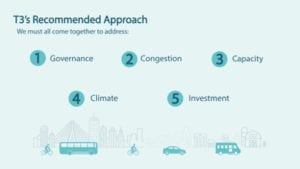Who is a member?
Our members are the local governments of Massachusetts and their elected and appointed leadership.

The Transportation Table makes recommendations in five key areas.
A broad coalition of 14 organizations, including the MMA, released a report today calling for an infusion of new resources to improve the array of transportation systems statewide.
The coalition, known as The Transportation Table, or T3, developed a series of recommendations in support of a transportation system that is accessible, reliable, resilient and fueled by clean energy.
“In metro areas, the increase in congestion threatens our economic future and the quality of life while driving up carbon emissions, leaving us woefully unprepared for climate change impacts,” the T3 report states. “Our rural areas face poor roads, crumbling bridges, and chronic underinvestment in transportation choices and regional connectivity. This crisis must not continue unattended.
“Transforming our transportation system is critical – and we must act now.”
T3 – a group of leaders across major sectors of Massachusetts (business, industry, municipalities and nonprofits) – lays out a series of recommendations for the Legislature, the administration and the state’s employers to address five key areas:
• The governance structure of transportation agencies, to boost accountability and transparency
• Congestion pricing to reduce congestion and emissions and generate revenue to improve bus and rail services and transit connectivity
• Improved capacity among public entities to be more responsive and deliver projects more quickly
• Climate change mitigation (to reduce emissions) and resilience (to protect against the ravages of extreme weather)
• Accelerated investment in transportation services and infrastructure, with more dedicated revenue now and in the future
The report concludes that an additional $545 million to $750 million per year must be invested over the next five years to meet the state’s transportation needs. T3 identified a number of possible funding sources, including an increase in the gas tax, introducing congestion tolling and expanding tolls, and using a substantial percentage of Transportation and Climate Initiative revenue to reduce emissions from the transportation sector.
“Stakeholders across all sectors agree that we must raise and invest substantial new resources to fix our ailing transportation system in rural, suburban and urban Massachusetts, and that any solution to the crisis must address all aspects – improving local and state roads and bridges, regional transit and transportation services, the MBTA, and making our infrastructure climate resilient,” said MMA Executive Director Geoff Beckwith. “We embrace The Transportation Table report, and appreciate its recommendation for increasing local Chapter 90 funding by $100 million a year to get our local roads in better and safer condition.”
The T3 report identifies a number of challenges contributing to the transportation crisis:
• Local road and bridge repairs are underfunded and their conditions are below federal standards.
• Regional transportation services cannot adequately address the travel demands of local residents, limiting economic growth across a broad swath of Massachusetts.
• High housing costs, particularly in Metro Boston, force people further away from their jobs, making their commutes longer, lessening quality of life, and increasing carbon emissions.
• Transportation agencies are not currently equipped to take on more without reforms.
• Much of the state’s transportation infrastructure is vulnerable to climate change impacts, and new projects are not designed for climate resilience.
• Transportation is the largest source of greenhouse gas emissions in Massachusetts, and emission-reduction goals cannot be met without dramatic reductions in transportation emissions.
• Existing revenues will not address the state’s transportation needs in order to ensure that Massachusetts remains livable and competitive.
“We envision a 21st century transportation system that no matter where people live, they can get where they need to go,” the report states.
In addition to the MMA, T3 includes A Better City, American Council of Engineering Companies of Massachusetts, Environmental League of Massachusetts, Kendall Square Association, Livable Streets, Metropolitan Area Planning Council, MassInc, Massachusetts Taxpayers Foundation, Transportation for Massachusetts, Massachusetts Business Roundtable, The Boston Foundation, Transit Matters, and Union of Concerned Scientists.